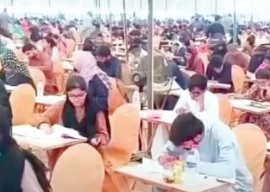The criminal justice system in Pakistan is still stuck in the colonial era and serves as a coercive, repressive and dominating force as opposed to a service-oriented force, according to the former Sindh Inspector General Police (IGP), Niaz Siddiki.
Siddiki was giving a presentation, titled ‘Structural and Institutional Gaps in the Policing System’, at the criminal justice system conference on Saturday. The former IGP said that the Police Act of 1861, the act that has most significantly shaped Pakistani’s criminal justice system, was a reaction to the 1857 Mutiny and that is why the police force in Pakistan is so repressive.
“This has never changed. As a result, every criminal offense is an act against the state and the complainant is an instrument to invoke the state,” said Siddiki. “Thus, the community depends on the magistracy but they are not accessible to the public without the use of the advocates.”
The police are not allowed to provide an avenue for justice but rather, just act as a force that records incidents through the First Incident Report.
“Why can’t the police moderate disputes and petty crimes on a community level?” Siddiki questioned, while saying that the officials have no capacity to solve people’s issues. “They just record an incident and then it has to go through an entire trial whereas it could be resolved in the beginning. When it goes to court it becomes a longstanding dispute.”
Most officers have 300 cases a year but their primary duties are security details, patrolling or taking prisoners to court, which Siddiki said leads to a weak investigation.
Police oversight
“In my opinion, the Citizens-Police Liaison Committee is very elitist,” said advocate Asad Jamal while speaking about the accountability of the police “It serves certain classes and it is not as efficient as it is portrayed in the public and by the media.”
According to Jamal, Pakistan needs an ombudsman, independent of the police, which can hold the police accountable.
He said that any civilian oversight of the police has to be borne out of a powerful statute and the full support of the public, but without this, any attempt of civilian oversight will fail.
Criminal justice and the ‘War on Terror’
After September 11, the United States and the United Kingdom devised comprehensive legal strategies to combat terrorism but according to Mohammad Mumtaz, an assistant professor at the College University Faisalabad, Pakistan has yet to come up with its own strategy.
“The prevailing security crisis in Pakistan is treated as a law and order situation rather than surrounding terrorism and insurgencies as an act of war,” said Mumtaz. The strategy that he advocated was similar to the approach taken in the US and the UK which garnered much criticism for violating civil rights. The professor criticised the Anti-Terrorism Act as being outdated. He also pointed a finger at the state for not providing witness protection.
Mumtaz blamed the police for not providing enough evidence in terrorism cases but Siddiki argued that the courts emphasis too much on witness testimony because of which the defence teams tailor their arguments accordingly and get acquittals.
Published In The Express Tribune, April 29th, 2012.

1732184775-0/BeFunky-collage-(80)1732184775-0-165x106.webp)

1731933289-0/BeFunky-collage-(68)1731933289-0-165x106.webp)

1732176172-0/Untitled-design-(8)1732176172-0-270x192.webp)
1732175528-2/Untitled-design-(5)1732175528-2-270x192.webp)










COMMENTS
Comments are moderated and generally will be posted if they are on-topic and not abusive.
For more information, please see our Comments FAQ